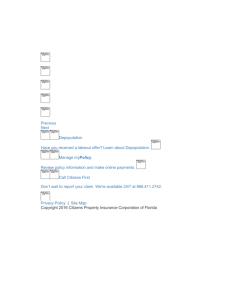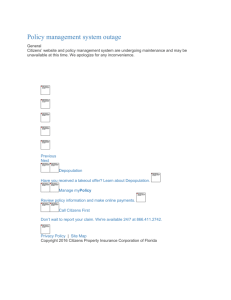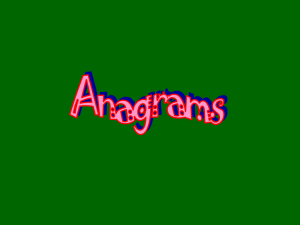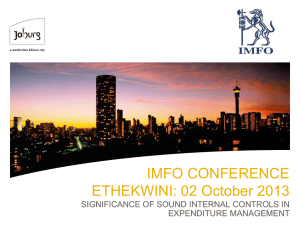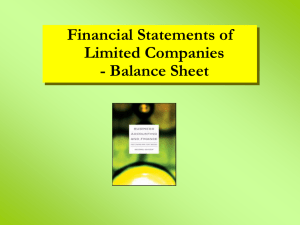On Farm Market Valuation - Department of Agriculture
advertisement
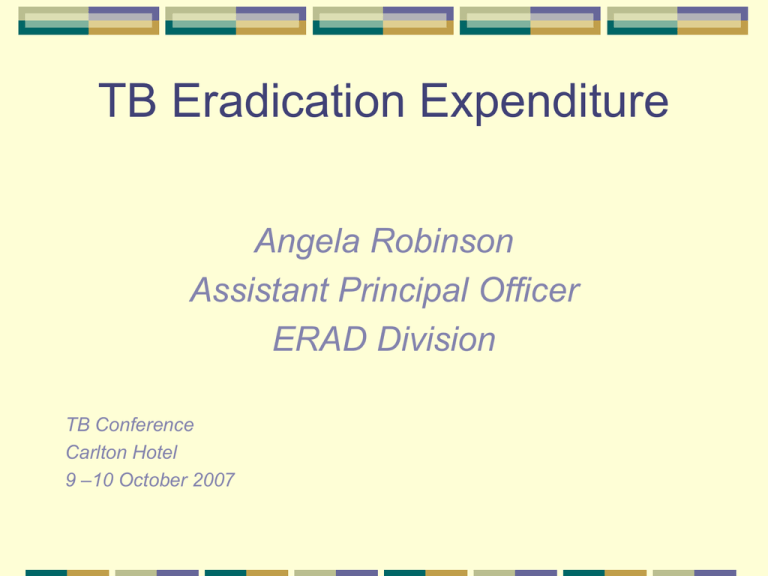
TB Eradication Expenditure Angela Robinson Assistant Principal Officer ERAD Division TB Conference Carlton Hotel 9 –10 October 2007 TB Programme – Expenditure Overview How much does the TB Eradication Programme cost? How is the TB programme financed? Main expenditure items, including compensation TB Programme - Gross expenditure (not incl. admin costs) 1999 2000 2001 2002 2003 2004 2005 2006 €m 49.5 45.5 34.7 40.7 40.1 36.3 39.6 38.3 TB Programme – Gross Expenditure 55 Millions 50 45 40 35 30 25 1999 2000 2001 2002 2003 Gross Expenditure 2004 2005 2006 TB Programme expenditure – sources of funding National Exchequer Farmer levies Estimated €13.9m in 1996 Estimated €10.4m in 2006 Further reduction in 2007 EU contribution TB Programme – main expenditure items Vet fees for herd testing Reactor collection service Supplies – purchase of tuberculin, kits Wildlife programme Research Compensation DAFF administrative costs Main expend items Vet fees – herd testing Pre 1996 all testing was paid by DAF Post 1996 to date farmer pays for one test per year except where reactors are disclosed Total spend on vet fees in 2006 was €8.59m Main expend items Reactor collection service Reactor collection from farm direct to slaughter plant Objective: rapid removal minimises risk of spread of disease Hauliers engaged following tender invitation Cost of RCS in 2006 was €0.8m Main expend items Supplies Supplies including tuberculin (€4m), supply of kits, lab equipment supplies Total spend on supplies in 2006 was €5m Main expend items – Wildlife programme 2000 Partnership Agreement Committed to enhancing wildlife strategy Funding increased from €1m in 2000 to €2.6m in 2006 Main expend items – Research Funding provided for: Centre for Veterinary Epidemiology and Risk Analysis (CVERA) The TB Diagnostics and Immunology Research Centre The Badger Vaccine project Various post-graduate studies Policy advice and epid. and scientific research Total spend on research 2000 was €1.1m and in 2006 was €2m Main expend items Compensation Schemes On Farm Market Valuation Payment Income Supplement Depopulation Grant Hardship Grant Penalties up to 100% where there are breaches of terms and conditions, legislation and/or disease control requirements On Farm Market Valuation - main terms Replaced reactor grant (flat rate) Fully rolled out in 2002 Market value – in line with EU Task Force recommendation - subject to ceilings €2,800 (inclusive of factory salvage price) per individual animal €3,500 for one pedigree stock bull per breakdown episode On-Farm Market Valuation main terms contd. Independent valuation Guideline market prices compiled weekly from selected marts issued to valuers Salvage value paid by factory to farmer DAFF pays difference between salvage value and market value DAFF pays full costs of 1st valuation Appeal and arbitration mechanisms Depopulation – main terms Objective: to compensate farmers for loss of income arising from depopulation Herdowner must agree to depopulation at the time specified by the Department Payable for animals removed where full or partial depopulation is considered appropriate Income Supplement – main terms Objective: to compensate farmers for loss of income arising from removal of animals Payable where removal is > than 10% of animals Depopulation not considered appropriate Maximum: first 100 animals only Hardship Grant – main terms Assists farmers with additional feed costs where animals are retained/fed during periods of restriction Eligibility period between 1 November and 30 April Following reactor re-test No off-farm income No income from milk sales Maximum €250.00 per month for a period not exceeding 4 months during eligibility period Conclusion - Objective of DAFF financial intervention Compensation removal of privately owned assets loss of income arising from restriction of movements Minimises risk of failure to disclose disease Payment for herd testing supports regulatory framework of the testing regime to progress eradication Rapid removal of reactors minimises risk of further spread of disease Research to underpin eradication/wildlife policy, including in particular, the development of vaccine
